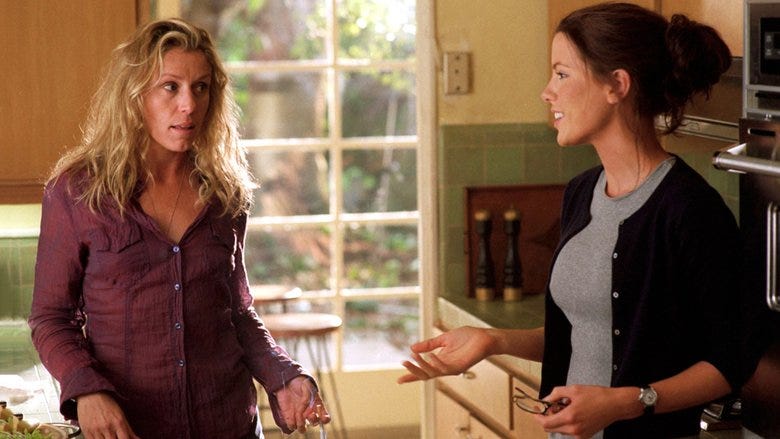laurel canyon
FIlm, 2003, 3.5 stars
Written and Directed: Lisa Cholodenko
Interesting from a lesbian director as well as girl-on-girl content perspective, Lisa Cholodenko's second big screen effort is neither as probing nor as tight as her first film High Art. Nonetheless with this film Cholodenko continued to prove herself an expert observer of human behaviour.
As in High Art, in Laurel Canyon we follow the choices of a naive yet quietly ambitious young girl who is captivated by the world of an older, more experienced and ultimately damaged woman. Kate Beckinsale's wide-eyed transformation from conservative medical student to pot-smoking, sex-kitten is utterly believable is the best I’ve seen her not acting as a vampire. The film belongs to Frances McDormand however, the older woman who steals every scene with her tough, sexy, yet still vulnerable portrayal.
Sam (Christian Bale) and Alex (Beckinsale)—a couple teetering frightfully on the edge of matrimony—are embarking on the next phases of their medical careers. Sam is a resident psychiatrist and Alex as a medical researcher. Their choices take them to LA where Sam has arranged to borrow the empty house of his mother with whom he has a somewhat estranged relationship.
The mother (Frances McDormand) is Jane, a successful record producer and music business reveller—the type who smokes heaps of pot, throws regular pool parties, lives in an enormous house and casually displays pictures of herself with Iggy Pop, Springsteen and Joni Mitchell on her bookcase.
As one of the characters casually mentions in the film, to live in Laurel Canyon is proof that you've "made it". Not only has Jane made it, but she's in danger of being "past it"—a lost, old soul in the new world of music marketing, teen labels and "we have to have it by Christmas" record deals.
When Sam and Alex arrive, not only is the house not empty, but Jane is in the middle of making a record with a new band and sleeping with the band's bratty lead singer Ian, who fancies himself as the hottest thing on the scene. The young couple are stuck living with Jane, at least temporarily.
Sam is mortified by Jane’s world, but he is completely mistaken in what he thinks Alex's reaction to it will be. Far from being repulsed, Alex is drawn in, both by the charisma of Jane and Ian and by the knowledge that maybe, in her perfectly formed life with Sam, she might never get to experience this kind of freedom again. The desires she feels mean nothing to her emotionally, but the thrill of the experience is everything, overriding even her deepest-held fears and compounding moral dilemmas.
Meanwhile, Sam becomes drawn to Sara (the stunning Natascha McElhone), a woman he works with at the hospital. She tries to attract him with promises of freedom and conscience-free sex, but in the end is forced to admit that she cannot separate her heart and her head, that she wants more from Sam than just a quick fling.
Alex is having no such difficulty separating sex and love. She loves Sam, but gradually becomes involved with Jane and Ian (the kisses between Beckinsale and McDormand are fascinating both for their unexpected chemistry and the confronting thought of Jane coming on to her son's girlfriend). She's more than willing to let her darker side walk free for just a few precious moments.
Unfortunately the world must and does come crashing down. To Cholodenko's credit though, she stops short of blaming anyone. It's nice to have characters just admit "things happen" for once, admit that their own worst (or best?) impulses took hold and left them no choice but to obey. Moralists may disagree, but sometimes being swept along in the current is the only way to stay afloat. Consequences or not, everyone involved needed these events to happen, simply to enable them to view their lives from a different perspective.
We do have to ask though, is the message here simply a classic "sex is easy, love is hard"? Or is it that we should experience everything because who wants to wake up when you're fifty and find you aren't living the life you were meant to?
Through it all there is one absolute. When we have relationships with people, however casual, we are responsible for how the things we do affect them. There is no running from that responsibility, even when we want to. A walk on the wild side is fine, but where does that leave the people we actually love? Whose responsibility is it to say no?
The film doesn't know the answers and doesn't offer them, leaving us with an excellent character piece but what feels like a truncated, cop-out ending. It’s OK not to have all the answers figured out, but if you lead audiences into these murky emotional waters, you should at least have the decency to offer a vague plan about how to get back out again.



